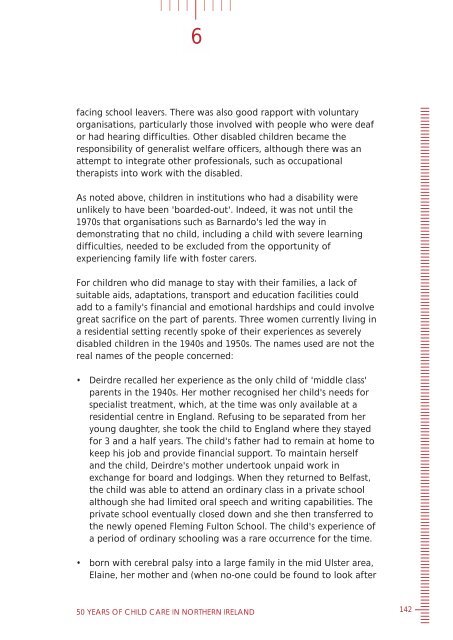childcare-50years
childcare-50years
childcare-50years
Create successful ePaper yourself
Turn your PDF publications into a flip-book with our unique Google optimized e-Paper software.
6<br />
facing school leavers. There was also good rapport with voluntary<br />
organisations, particularly those involved with people who were deaf<br />
or had hearing difficulties. Other disabled children became the<br />
responsibility of generalist welfare officers, although there was an<br />
attempt to integrate other professionals, such as occupational<br />
therapists into work with the disabled.<br />
As noted above, children in institutions who had a disability were<br />
unlikely to have been 'boarded-out'. Indeed, it was not until the<br />
1970s that organisations such as Barnardo's led the way in<br />
demonstrating that no child, including a child with severe learning<br />
difficulties, needed to be excluded from the opportunity of<br />
experiencing family life with foster carers.<br />
For children who did manage to stay with their families, a lack of<br />
suitable aids, adaptations, transport and education facilities could<br />
add to a family's financial and emotional hardships and could involve<br />
great sacrifice on the part of parents. Three women currently living in<br />
a residential setting recently spoke of their experiences as severely<br />
disabled children in the 1940s and 1950s. The names used are not the<br />
real names of the people concerned:<br />
• Deirdre recalled her experience as the only child of 'middle class'<br />
parents in the 1940s. Her mother recognised her child's needs for<br />
specialist treatment, which, at the time was only available at a<br />
residential centre in England. Refusing to be separated from her<br />
young daughter, she took the child to England where they stayed<br />
for 3 and a half years. The child's father had to remain at home to<br />
keep his job and provide financial support. To maintain herself<br />
and the child, Deirdre's mother undertook unpaid work in<br />
exchange for board and lodgings. When they returned to Belfast,<br />
the child was able to attend an ordinary class in a private school<br />
although she had limited oral speech and writing capabilities. The<br />
private school eventually closed down and she then transferred to<br />
the newly opened Fleming Fulton School. The child's experience of<br />
a period of ordinary schooling was a rare occurrence for the time.<br />
• born with cerebral palsy into a large family in the mid Ulster area,<br />
Elaine, her mother and (when no-one could be found to look after<br />
50 YEARS OF CHILD CARE IN NORTHERN IRELAND<br />
142


